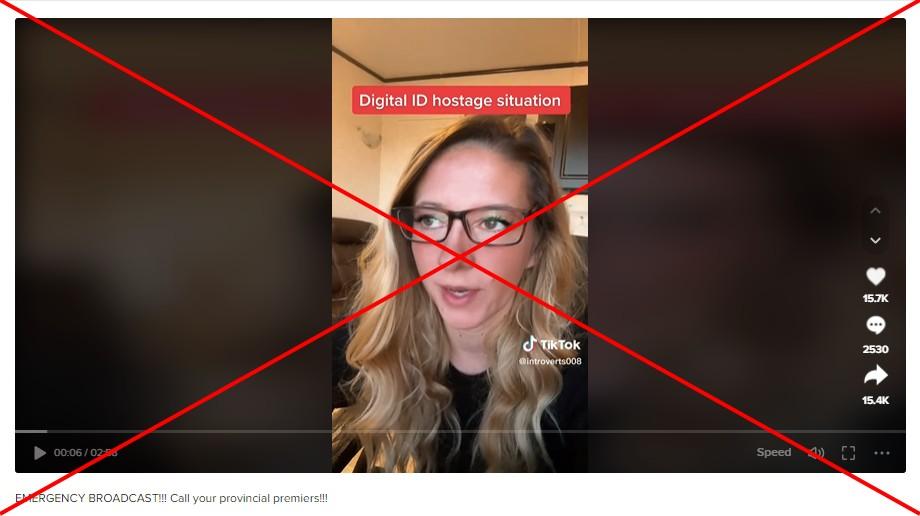
Canada federal health funding not tied to digital IDs
- This article is more than two years old.
- Published on March 15, 2023 at 19:59
- 3 min read
- By Gwen Roley, AFP Canada
"Digital ID Hostage situation," says the text over a TikTok video posted on February 8, 2023. "Yesterday, in Canada, Justin Trudeau met with all of our provincial premiers and basically told them that we will not be able to get funding for our health care unless the premiers agree to the digital IDs," the speaker in the video claims, referencing online credentials that would be used for a wide range of government services, which have been met with privacy concerns.
The video on TikTok was viewed more than 15,000 times and shared on Facebook, Instagram and YouTube, with its claims repeated in online articles.

The claims began spreading at the start of negotiations between Trudeau and the provincial premiers over the updated Canada Health Transfer, funding from the federal government which is infused into the health budgets of provinces and territories.
The provinces accepted the federal proposal for $46.2 billion on February 13 and agreed to improve the way health information is collected, stored and shared and to implement common practices for health data, but there are not plans to use this in digital identification documents.
"The Government of Canada will not create a single health data system or a national health care digital ID," said Anne Genier, a spokeswoman for Health Canada, in an email to AFP on March 8.
"As it stands, digital systems across the country are highly fragmented leading to limited ability to collect, share and use health data," Genier said.
The meetings between the premiers and Trudeau yielded the collective goal to improve the safe flow of information across health systems, she said.
Government officials in Saskatchewan and Alberta also confirmed the receipt of new funds does not require the adoption of a digital ID.
"When I look at the four funding envelopes, and some of the shared priorities, there's no requirement for a digital ID program, sharing people's health records, in order to receive the funding," Saskatchewan Premier Scott Moe told reporters on February 13.
Moe acknowledged the province already shares aggregate health data to look for ways to improve the health system.
"By no means will people's personal health care data be shared, nor can it be legally. Nor was it ever requested," he said.
Scott Johnston, a spokesman for the Ministry of Health of Alberta, said in an email on March 10 that the federal government did not request further data sharing from the province.
Misleading screenshot
The video includes a screenshot from a CBC article, which quotes a document from the federal government. Neither the CBC article nor the February 7 press release from the prime minister's office mention digital IDs.
"Canadians should be able to access their own health information and benefit from it being shared between health workers, across health settings, and across jurisdictions," the press release says. "That is why provinces and territories are also asked to agree to adopt common standards and policies related to data."
Provincial and territorial governments already collect and share aggregate health data -- within the bounds of their respective privacy legislation -- with national institutions including the Canadian Institute for Health Information (CIHI). CIHI uses this data to track national trends, such as hospital wait times or access to a primary health care provider.
"Canadians have a right to privacy, and CIHI is committed to upholding that right and safeguarding their personal information," said Claire Brassard, a spokeswoman for CIHI in a March 10 email.
Digital credentials in Canada
The video goes on to claim that Canada's digital ID would be required of citizens to access health care, banking or to set up a social media account, but there are currently no mandatory digital credentials in Canada.
The federal government's website says it is exploring more online tools -- describing the potential for a digital version of a driver's license or health card -- but the creation of these types of systems is still in the planning stages.
Other forms of optional digital IDs already exist at the provincial level in Alberta and British Columbia.
More of AFP's reporting on misinformation in Canada can be found here.
Copyright © AFP 2017-2026. Any commercial use of this content requires a subscription. Click here to find out more.
Is there content that you would like AFP to fact-check? Get in touch.
Contact us
